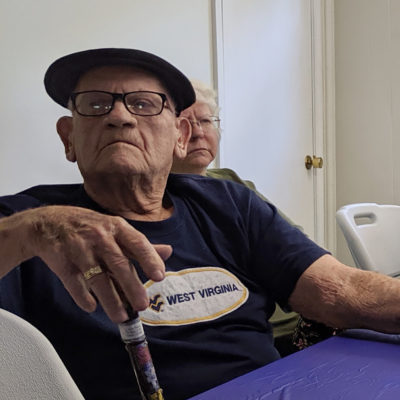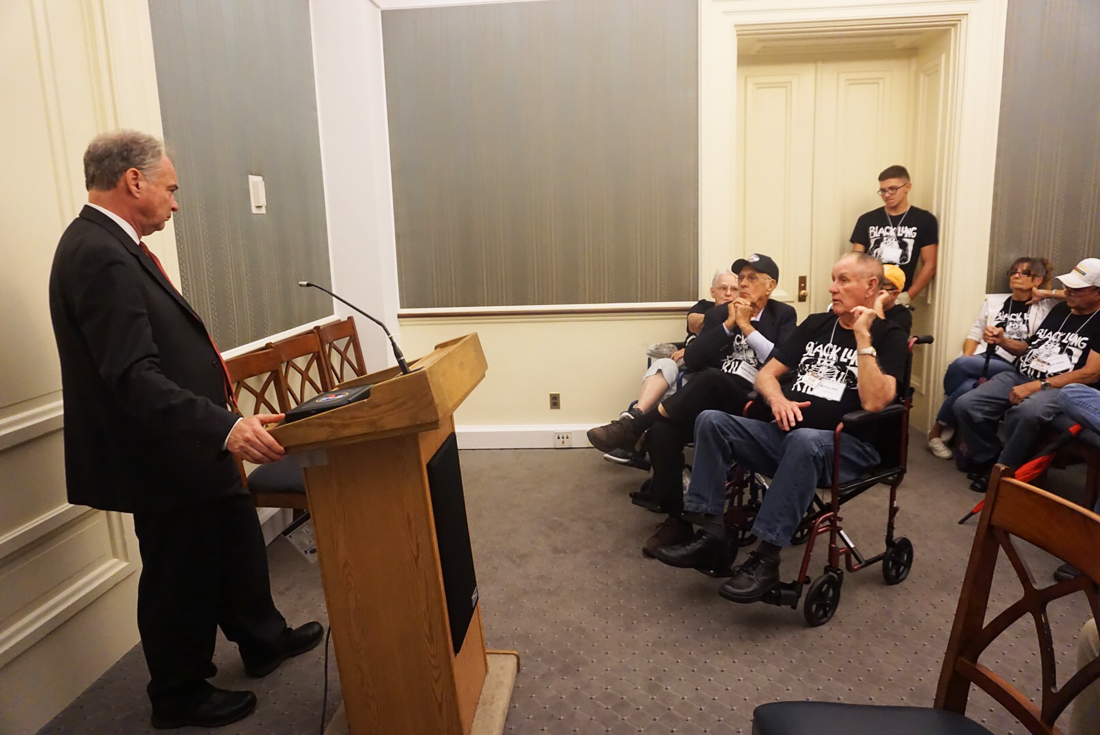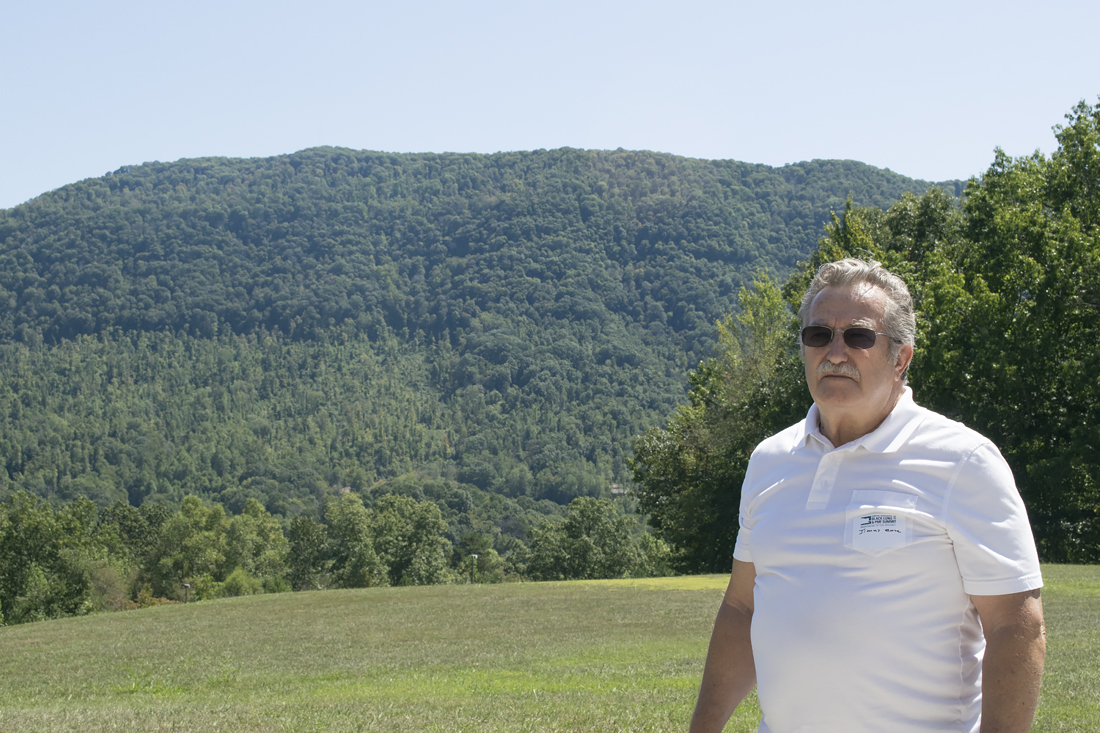The Black Lung Association Responds to the Deadly Disease’s Rise

Retired miner Leonard Pettry listens to a speaker at a Dawes, W.Va., Black Lung Association meeting. Photo by Kevin Ridder
Once a month, the back room of the Mt. Zion Church in the unincorporated community of Dawes, W.Va., plays host to the Kanawha County chapter of the Black Lung Association. Like other chapters, the group is dedicated to helping miners obtain healthcare benefits through education and advocating for legislation.
The Kanawha County chapter was formed in early 2019, making it one of the newest chapters of the roughly 50-year-old association. When the organization was founded, members were focused first on convincing legislators that the fatal, incurable condition caused by overexposure to coal and silica dust was an occupational disease and that those afflicted and their families should receive workers’ compensation. Once a miner is deemed eligible for black lung healthcare, federal law stipulates that the coal company that last employed the miner for at least one year is responsible for doling out monthly payments. If the company is unable to pay, usually due to bankruptcy, then the federal government pays through the Black Lung Disability Trust Fund.
Today, members are mainly focused on shortening the legal process to receive black lung benefits — an uphill struggle against bureaucracy and coal company lawyers that can often take a decade or more — and on securing funding for the Black Lung Disability Trust Fund. The trust fund helps support coal miners and their surviving dependents in cases where the miners’ employer has either gone bankrupt or has been found not responsible. Set up in 1977, the trust fund is funded by an excise tax paid by companies per ton of coal sold domestically at a tax rate that was unchanged for more than three decades. But Congress failed to extend this tax rate before the end of 2018, resulting in a 55 percent cut to the tax.
In Kanawha County, nearly 20 former coal miners, their family members and others gather around purple and white tables to discuss upcoming events and the goings-on of the chapter. Talk turns to politics as the group begins to discuss the chapter’s participation in a July visit to Congress by more than 150 coal miners with black lung or their loved ones from across Appalachia.
The coalition of coal miners and their supporters made the long bus trip to call for a 10-year reinstatement of the excise tax rate and stronger workplace protections to prevent the disease. In the capitol, the delegation met with 22 congressional offices and held a roundtable discussion that included four U.S. senators, miners and the president of the United Mine Workers of America.
Federal and state legislators have introduced new bills meant to help coal miners with black lung (see below). But many Kanawha County Black Lung Association members and others expressed frustration that Senate Majority Leader Mitch McConnell (R-KY) only gave a few minutes of his time to the visiting miners and offered no assurances that he would support the excise tax extension.
“I think we left a good impression on everybody but Mitch McConnell,” says Jimmy Moore, president of the Black Lung Association chapter in Whitesburg, Ky.

Miners with black lung talk with U.S. Sen. Tim Kaine at the capitol during a lobbying trip in July. Roughly 150 miners and family members made the trip along with groups like Appalachian Voices and Appalachian Citizens’ Law Center. Photo by Erin Savage
Rates of black lung disease have skyrocketed in recent years. According to an August 2018 study conducted by federal researchers, one in five Central Appalachian coal miners who have spent 25 years or more working underground suffer from black lung disease, a 25-year high.
Kanawha County Black Lung Association President Jerry Coleman worked underground for 37 years. As a result, he was diagnosed with black lung and lung cancer.
“[Black lung] will rob your life,” says Coleman after the chapter’s meeting. “It takes things away from you that you should be able to do. I can’t hunt because I can’t go up a hill, I can’t play with my grandkids; it robs you of everything.”
“If I had to do it, I wouldn’t do it again, work in the mines,” he adds. “My health is worth more than the money.”
A History of Activism
Although miners had implored the United Mine Workers of America to declare black lung an occupational disease since at least 1942, the union had yet to do anything about it by the late 1960s, according to a West Virginia Encyclopedia article by West Virginia University history professor Paul H. Rakes. After a mine explosion killed 78 miners in November 1968 and politicians and the UMWA president defended the company, miners decided to take matters into their own hands.
In December 1968, a group of miners in Montgomery, W.Va., formed the first chapter of the Black Lung Association, according to Rakes. Hundreds of miners in southern West Virginia went on strike the following February to demand mine safety standards and workers’ compensation for black lung disease while the state legislature was discussing mine legislation. When it looked like the state House was going to pass weak mine safety standards, more than 40,000 West Virginia coal miners went on strike, leading to the passage of a stronger bill.
Later in 1969, Congress passed the Federal Coal Mine Health and Safety Act, which enacted the first mine safety standards including limits on dust levels. The law also required companies to pay compensation for miners disabled by black lung or their widows, with a federal fund established as a backstop. The law also created what would become the U.S. Mine Safety and Health Administration and stipulated that if a coal miner was disabled from a lung disease and had mined for at least 15 years, they were eligible for benefits unless their employer could prove the impairment was not a result of mining.
Rakes writes that, by the early 1970s, black lung benefit payments were costing the federal government nearly $1 billion per year. This led to the creation of an excise tax on coal companies in 1977 for each ton of coal mined to support the Black Lung Disability Trust Fund. Almost immediately, the trust fund went into the red — today, it’s more than $4 billion in debt.
In the 1980s, President Ronald Reagan’s administration enacted much stricter black lung disability eligibility requirements, which included ending the presumption that miners who were disabled from a lung disease and worked for 15 years had black lung and making it more difficult for widows to receive benefits. This meant miners needed to be diagnosed by a federally approved doctor before getting benefits.
John Cline, an attorney based in Piney View, W.Va., has represented coal miners in black lung benefits cases since the early 1990s. He says that the Reagan-era eligibility requirements “put a real hardship on [widows] at a bad time.”
“When the miner passed, the widow not only lost her spouse, but lost the black lung benefits at the same time,” says Cline. “And then they had to file again to establish their own entitlement to benefits, which could take a long time, usually years, to establish that, and it was virtually impossible to establish it if they died of a heart attack or a car accident or something other than a pulmonary death.”
“All through the 1990s, the Black Lung Association was making annual trips with support from the UMWA to Washington to lobby for the reinstatement of the widows provision and the 15-year presumption,” he continues. “So the bill would be introduced every year through most of those years.”
Cline states that the continued activism of the Black Lung Association was critical for the inclusion of the Byrd Amendments in the 2010 Affordable Care Act, which re-established the 15-year presumption and made it so the miner’s spouse automatically received widow’s benefits after the miner’s death. However, it can still take years for a miner’s black lung claim to process.
A Long Process
Once doctors diagnosed Kanawha County Black Lung Association President Jerry Coleman with the disease, he waited almost seven years before he was awarded black lung benefits. Unfortunately, this story is all too common among miners with black lung and their surviving dependents.
When a miner or their survivors file a claim to receive federal benefits, a U.S. Department of Labor physician performs a medical exam to determine if the miner has or had black lung disease. After allowing the miner and the coal company to submit any additional evidence, an agency district director either approves or denies a claim, typically after one year.
If the claim is approved, the coal company almost always appeals the decision, which can lead to the miner’s request for benefits bouncing around in legal limbo for years.
“In five years, they’re hoping you’ll die,” says Coleman. “Then they just got to pay your wife if you’re married. If you ain’t married, they don’t pay nothing.”
It took 14 years for Southwest Virginia Black Lung Association Founder Bethel Brock to receive his federal black lung healthcare. Now, he uses that experience to help other coal miners apply for benefits.
“We try to educate miners on and give them information on what they can do to win a case, and what they should or should not do,” says Brock.
“The company lawyers drag it on so they can add to their bill,” he adds. “They get paid win, lose or draw. We get paid if we win only.”
Brock notes that this tends to deter lawyers from taking on black lung cases. Due to this and other reasons, only 42 percent of claimants are represented by lawyers during the initial black lung benefits eligibility determination.
Since founding chapters in Norton and Vansant, Va., Brock has worked to start up another chapter in Harlan, Ky.
“I think we can build this organization, and we’re going to have to,” he says. “The politicians understand numbers, and that’s about it.”
Looking Forward
Now an author and Virginia Tech professor emerita of women’s and gender studies, Barbara Ellen Smith came to West Virginia in the early 1970s to work with the Black Lung Association and has been involved in miners’ rights ever since. Smith is currently working on a follow-up to her 1987 book, “Digging Our Own Graves: Coal Miners and the Struggle over Black Lung Disease.”
With the ongoing decline in union mines, Smith states that the Black Lung Association’s efforts to address the health needs of miners is critical.
“That kind of organizing just becomes more and more necessary,” says Smith. “And the union is of course fighting the same battle for the Black Lung Disability Trust Fund, for pensions, for medical benefits. So there’s kind of a convergence because so much of the UMWA constituency is now retired.”
As many mines are reduced to extracting thinner seams of coal, the amount of dangerous silica dust that miners breathe in has risen greatly in the past few years. This, combined with coal companies allegedly submitting tampered dust samples and working miners longer hours, has led to a massive resurgence in both black lung and progressive massive fibrosis, or complicated black lung, an advanced stage of the disease.
“The horrible rates of the disease really cry out for a silica standard in coal, and they cry out for much more vigilance and monitoring of dust levels,” Smith says.
She states that the decline in union mines has made the profession a much more dangerous one.
“There remain union mines, but they’re few and far between,” she says. “[The UMWA’s decline] was very much a matter of certain coal operators deciding that they wanted the flexibility to run their mines absolutely as they saw fit.”
In regards to the resurgence in black lung disease, Smith says, “Obviously, silica is an issue. But I would also argue that the decline of the union is fundamental. The human element does control the production of dust.”

Retired miner Jimmy Moore, president of the Whitesburg, Ky., Black Lung Association. Photo by Kevin Ridder
Jimmy Moore, president of the Black Lung Association chapter in Whitesburg, Ky., worked in a union mine for 22 years. He filed an initial claim for healthcare benefits in early 2019 and has yet to hear back. Moore’s son, who worked in a non-union mine for about 27 years, suffers from complicated black lung disease.
“I was exposed to a lot of dust, but not like my son was,” says Moore. “It’s supposed to be a law that you can’t work more than 15-and-a-half hours in the mines, and my son would work 20 hours and go right on.”
“I think when the unions started falling away, that’s when the complicated black lung started coming up more, because they was working in more dust and longer hours, too,” he adds.
Some states like Kentucky provide their own black lung benefits through the workers’ compensation program. Moore says these are easier to access than federal benefits, and that his son is using the program.
“I love working [with the Black Lung Association], and I love coal mining,” says Moore. “I did, and he did too. But then after you don’t know the damage that it’s doing to you, you think when you’re young, you’re invincible, and you can just take on the world I guess is what you might say.”
Barbara Ellen Smith states that while the Black Lung Association is by no means a replacement for the union, it has served a very important purpose for communities.
“They’re a place to gather, to share information and to get help with federal black lung compensation claims,” says Smith. “But also they perform a kind of social function for people whose local union has shut down.”
Moore reiterates that he loves being involved in the Black Lung Association, and that he’ll be turning 74 soon.
“I’m gonna be to where I can’t go to Washington and fight for what we’ve got,” says Moore. “But I really enjoy being with my brothers and each of us fighting for what we think is right for our self and for the widows, and for the young miners that has complicated black lung.”
Meanwhile, the Black Lung Association continues to push for the passage of legislation to address the deadly disease and make it easier for those affected to obtain benefits (read about some of these bills below). Moore emphasizes that organizing new chapters has been critically important in getting legislators’ attention.
“I’ve been up there three times, fighting for it,” he says. “I think it’s a good thing, and we’ve got a lot of backing now.”
Take action: Ask Congress to restore the tax on coal companies that funds the Black Lung Disability Trust Fund. Call 855-980-2358 to hear a brief message about what to say, and then be connected with your representative.
Black Lung Legislation
State and federal legislators have introduced several bills in 2019 that support black lung benefits. Bills that awaited decision in committee as of press time in early October are marked with an asterisk.
Federal
- S.2205*, The Black Lung Benefits Improvement Act: Introduced by Sen. Robert Casey (D-PA), S.2205 would create a fund to pay up to $4,500 in attorneys’ fees and up to $3,000 in “reasonable and unreimbursed” medical bills while the case is established, require all parties to disclose all medical evidence, strengthen criminal penalties for false statements during the case, and more.
- S.27*, The American Miners Act of 2019: Introduced by Sen. Joe Manchin (D-WV), S.27 would transfer additional funds to the United Mine Workers of America Pension Plan, extend and increase the excise tax that funds the Black Lung Disability Trust Fund, and more.
- H.R.170*: Introduced by Rep. Morgan Griffith (R-VA), H.R.170 would amend the Black Lung Benefits Act to preserve the Byrd Amendments of the Affordable Care Act in the event that the ACA is repealed, making it easier for miners who worked underground for 15 years and their widows to receive benefits.
- H.R.3876*, The Black Lung Benefits Disability Trust Fund Solvency Act: Introduced by Rep. Bobby Scott (D-PA), H.R.3876 would restore the former rate of the excise tax on coal companies that funds the Black Lung Disability Trust Fund and extend that rate through 2029.
West Virginia
- Resolution 59 requests the state to study the causes of increased black lung rate, determine the best way to compensate those affected, implement policies to reduce disease risk, and determine ideal testing methods to diagnose black lung. The state Senate passed the resolution in March, and it awaits decision in the House.
- S.B.260* would allow miners to receive partial disability awards if they are diagnosed with black lung but not found to be impaired by the disease.
- S.B.144* would create a state black lung healthcare program that would provide a minimum of $300 a month to miners who establish that they were exposed to coal dust for at least 10 years.
- H.B.2588* would clarify that there is no time limit for a miner to request a review from a state board that assesses work-related pneumoconiosis compensation cases, challenging a recent West Virginia Supreme Court decision.
Kentucky
- H.B.75* would repeal a 2018 state law that halved the amount of doctors that miners could visit to obtain a black lung diagnosis.
Related Articles
Latest News

Leave a comment
Your email address will not be published. Required fields are marked *





Leave a Comment